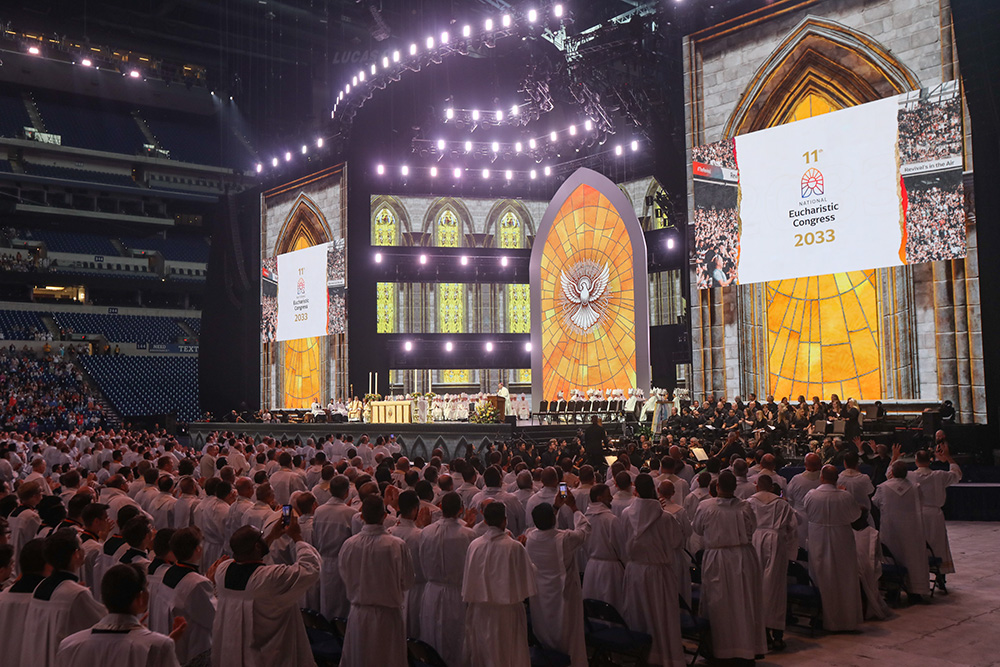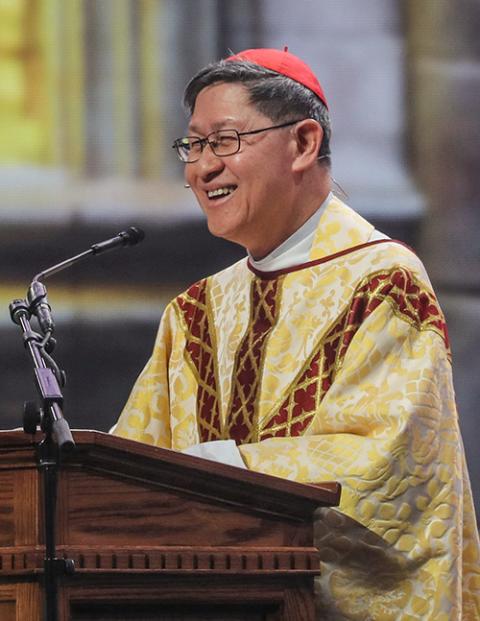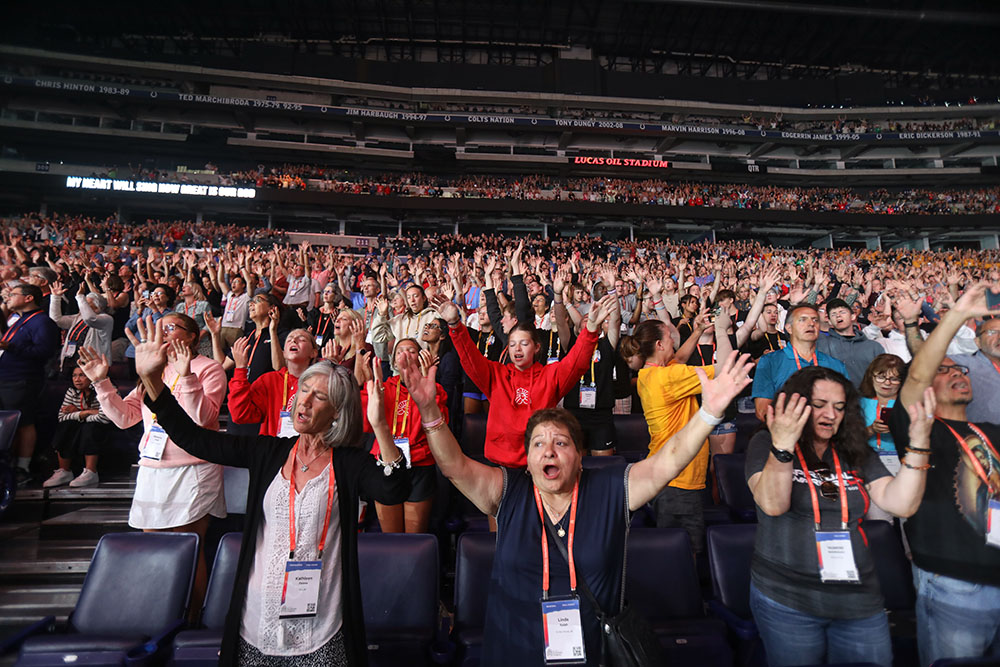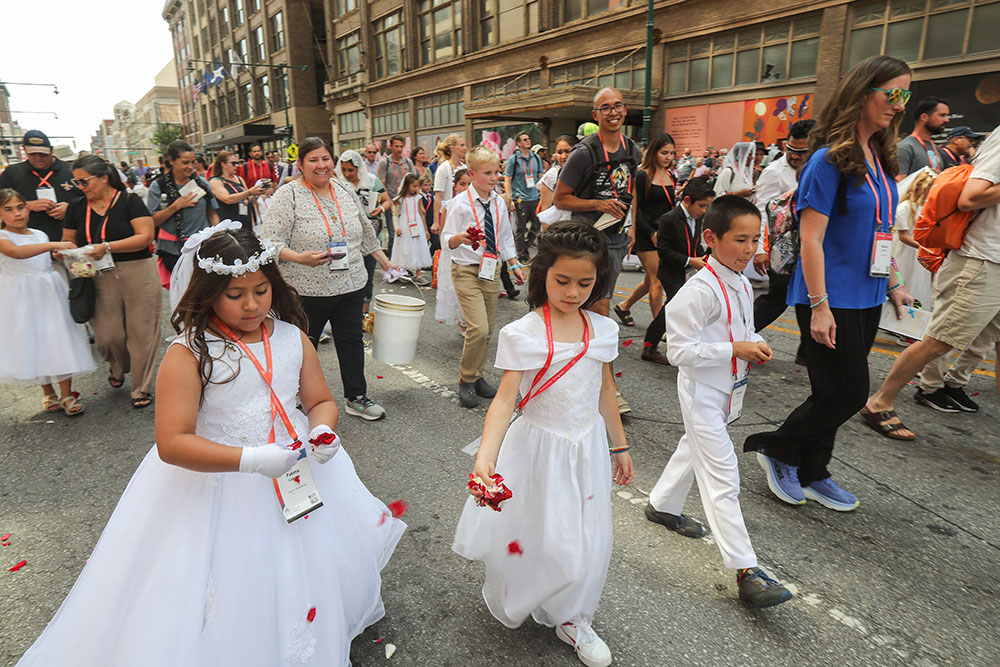
Bishop Andrew Cozzens of Crookston, Minnesota, announces July 21 — the final day of the National Eucharistic Congress at Lucas Oil Stadium in Indianapolis — that a Eucharistic pilgrimage from Indianapolis to Los Angeles is being planned for spring 2025. Congress organizers were also considering holding an 11th National Eucharistic Congress in 2033. (OSV News/Bob Roller)
No sooner had the 10th National Eucharistic Congress wrapped up July 21 here than Bishop Andrew Cozzens of Crookston, Minnesota, told 50,000 attendees at Lucas Oil Stadium that plans are underway for the next congress.
Cozzens, who served as the point man for the U.S. Conference of Catholic Bishops in organizing the July 17-21 congress, announced after the event's closing Mass that the 11th National Eucharistic Congress could be held in 2033, which would mark the 2,000th anniversary of the passion, death and resurrection of Jesus Christ.
"Two thousand years of redemption. That's worth celebrating right," said Cozzens, who also hinted, however, that the next congress could be held sooner.
"We'll keep discerning and we'll let you know," Cozzens said.
With those words, which included an announcement that the bishops are organizing another eucharistic pilgrimage in spring 2025 where pilgrims will walk from Indianapolis to Los Angeles, the five-day congress ended.
For almost a whole week, tens of thousands of people descended on downtown Indianapolis for a gathering that featured liturgies, adoration of the Blessed Sacrament, musical and dramatic performances, panel discussions, a procession, and individual presentations on various topics related to the Eucharist.
Advertisement
The U.S. bishops hope that the congress, the climactic event of their three-year National Eucharistic Revival, will revitalize the Catholic Church in the United States by reaffirming the real presence of Christ in the Eucharist and encouraging Catholics to become "eucharistic missionaries" in their everyday lives.
"The missionary is a gift. Mission is not just about work, but also about the gift of oneself," said Filipino Cardinal Luis Tagle, the papal delegate to the congress. Tagle, who is pro-prefect of the Dicastery for Evangelization's Section for First Evangelization and New Particular Churches, served as the main celebrant for the closing Mass on July 21.
Tagle said in his homily that, before traveling to Indianapolis, he asked Pope Francis if he had a message for the people attending the first national eucharistic congress held in the United States since June 1941 in Minnesota.
"He said, 'Conversion to the Eucharist! Conversion to the Eucharist!'" said Tagle, who added that the pontiff urged him to "behave well."

Cardinal Luis Tagle delivers the homily July 21 during the final Mass of the National Eucharistic Congress in Indianapolis. (OSV News/Bob Roller)
In a letter that Francis also sent to Tagle, the cardinal said that the pope expressed his hope that those who attended the congress would be "fully aware of the universal gifts they receive from heavenly food and may impart them to others."
"The presence of Jesus in the Eucharist is a gift, and the fulfillment of his mission," said Tagle, who emphasized giftedness as a theme throughout his homily.
"Where there is a lack or a weakening of missionary zeal, maybe it is partly due to a weakening in the appreciation of gifts and giftedness," said Tagle, who encouraged people to not think of their self-worth in terms of career accomplishments.
"If our horizon is only that of achievement, success and profit, there is no room to see and receive gratuitous gifts," he said. "There is no place for gratitude and self-giving. There will only be a relentless search for self-affirmation that eventually becomes oppressive and tiring, leading to more self-absorption, or individualism."
The cardinal also urged his listeners to follow Jesus' example in offering the gift of self to the people they encounter.
Said Tagle, "Friends, what do you see in a poor person? In a homeless person? In a sick person? What do you see in a person, in someone who differs from you? Like Jesus, let us give a gift of presence to each other."
The cardinal delivered his homily to a football stadium packed with an estimated 50,000 people that included 200 bishops, 500 seminarians and hundreds of priests who processed into the arena. The Indianapolis Symphony Orchestra performed traditional and modern Catholic hymns during the liturgy.

Pilgrims sing along with Catholic musician Matt Maher during the July 20 revival night of the National Eucharistic Congress at Lucas Oil Stadium in Indianapolis. (OSV News/Bob Roller)
The Mass followed a morning speaking program where presenters urged attendees to take everything they had experienced during the congress back home to their parishes, families and communities.
"As we leave this congress, let's go as missionaries," said Mother Adela Galindo, foundress of the Servants of the Pierced Hearts of Jesus and Mary, a religious community in the Miami Archdiocese.
"This wasn't just a congress. It's not just an event. It's a movement," said Montse Alvarado, the president and chief operating officer of EWTN News who served as an emcee for the event.
In its speakers and breakout sessions, which included several presentations on controversial topics like abortion and gender dysphoria, the congress was flavored in large part by the kind of conservative American Catholicism associated with Franciscan University of Steubenville, Ohio, and featured on the Eternal Word Television Network (EWTN).
But the event had crosscurrents of other Catholic sensibilities, as a handful of speakers, exhibitors and musical performers presented other viewpoints and distinct expressions of Catholicity. During a large procession through downtown Indianapolis on July 20, a Native American folkloric group performed traditional Indigenous music and dance.
The American church's growing and vibrant Hispanic community was well-represented among congress-goers, many of whom proclaimed, "Viva Cristo Rey!" during the procession as a truck drove by transporting the exposed Eucharist in a monstrance.

Young pilgrims throw rose petals during the final eucharistic procession of the National Eucharistic Congress in downtown Indianapolis July 20. (OSV News/Bob Roller)
In his opening remarks, Tagle greeted Mass attendees in several languages, including English, Spanish, French, Portuguese, Chinese, Vietnamese and Swahili, among others. Congress organizers said attendees hailed from all 50 states and 17 countries, speaking 43 languages.
"We're so lucky to be Catholic," Diane Scheftgen of Milwaukee told NCR as she stood near a downtown sidewalk observing the procession, which she described as "amazing."
"I feel so lucky and blessed to be here," Scheftgen said. "How blessed are we to have Jesus? He's always with us."
While some observers of U.S. Catholicism expressed doubts that the bishops' plan to promote a traditional and devotional form of the faith will attract new converts or appeal to fallen-away Catholics, several of those who participated in the congress' evening revival sessions — which featured musical performances and testimonies along with eucharistic adoration — said they were personally moved by the proceedings.
"The beautiful presence of Jesus permeated the entire stadium so strongly and wonderfully and warmly," said Briana Alece Jansky, who traveled to Indianapolis from her home in Tyler, Texas.
"Celebrating this historic moment with over 50,000 other Catholics together all focused on Jesus felt like a little slice of heaven. The presence of Christ permeated my entire existence," Jansky said.








